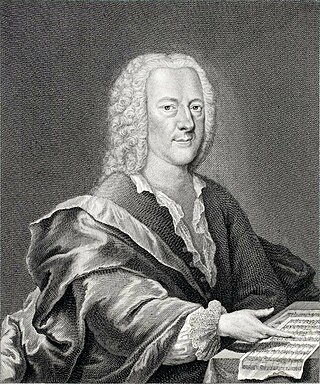
Reinhard Keiser was a German opera composer based in Hamburg. He wrote over a hundred operas. Johann Adolf Scheibe considered him an equal to Johann Kuhnau, George Frideric Handel and Georg Philipp Telemann, but his work was largely forgotten for many decades.
In music, galant refers to the style which was fashionable in the upper-class societies of Western Europe from the 1720s to the 1770s. On the other hand, the term found a narrowing in musicology in the 19th and 20th centuries: the focus is on compositions that can be seen as moving away from the Baroque in its more rhetorical formal language, but which at the same time only display qualities that can be attributed to the pre-classical period to a limited extent. At this point, the galant style can be seen as a step towards the formally freer, sensitive style, Empfindsamkeit, that prepared the early classical period.
The doctrine of the affections, also known as the doctrine of affects, doctrine of the passions, theory of the affects, or by the German term Affektenlehre was a theory in the aesthetics of painting, music, and theatre, widely used in the Baroque era (1600–1750). Literary theorists of that age, by contrast, rarely discussed the details of what was called "pathetic composition", taking it for granted that a poet should be required to "wake the soul by tender strokes of art". The doctrine was derived from ancient theories of rhetoric and oratory. Some pieces or movements of music express one Affekt throughout; however, a skillful composer like Johann Sebastian Bach could express different affects within a movement.

Lorenz Christoph Mizler von Kolof was a German physician, historian, printer, mathematician, Baroque music composer, and precursor of the Enlightenment in Poland.
The Handel Prize is an annual award, instituted in 1956, which is presented by the city of Halle, in Germany, in honour of the celebrated Baroque composer George Frideric Handel. It is awarded, "for exceptional artistic, academic or politico-cultural services as far as these are connected with the city of Halle's Handel commemoration". The prize consists of a diploma, a gold and enamel badge, and is presented during the annual Handel Festival, Halle.
Friedrich Nicolaus Bruhns or Brauns was a German composer and music director in Hamburg.

The Oper am Gänsemarkt was a theatre in Hamburg, Germany, built in 1678 after plans of Girolamo Sartorio at the Gänsemarkt square. It was the first public opera house to be established in Germany: not a court opera, as in many other towns. Everybody could buy a ticket, like in Venice. Most works were in the German language or translated librettos.

Gensericus oder Sieg der Schönheit TVWV 21:10 is a comic German-language opera in three acts by Georg Philipp Telemann. It was performed at the Oper am Gänsemarkt, while Keiser was director. Unlike Orpheus and Flavius Bertaridus, the opera contains no Italian-language set piece arias. The librettist was Christian Heinrich Postel.
Christian Heinrich Postel was a German jurist, epic poet and opera librettist, who wrote 28 libretti for the Oper am Gänsemarkt in Hamburg: set by composers such as Johann Philipp Förtsch, Reinhard Keiser and Georg Philipp Telemann. His texts for a St John Passion were set by composers Christian Ritter, Johann Mattheson and Johann Sebastian Bach in their respective St John Passion.
Wolfgang Ruf is a German musicologist and emeritus professor.
Klaus Hortschansky was a German musicologist.
Werner Hermann Georg Braun was a German musicologist.
Andreas Holschneider was a German music historian and writer.
Hans Joachim Marx is a German music historian. He has been professor of European music history at the University of Hamburg.
Walter Karl August Serauky was a German musicologist and Handel scholar.
Tiburtius Tibor Kneif was a German-Hungarian lawyer and musicologist.
Ute Jung-Kaiser, néeJung is a German musicologist.
Ludwig Holtmeier is a German music theorist and piano player.
Daniela Philippi is a German musicologist with a research focus on Christoph Willibald Gluck, Antonín Dvořák and Czech music history and music of the 20th century.
Günter Fleischhauer was a German musicologist.



